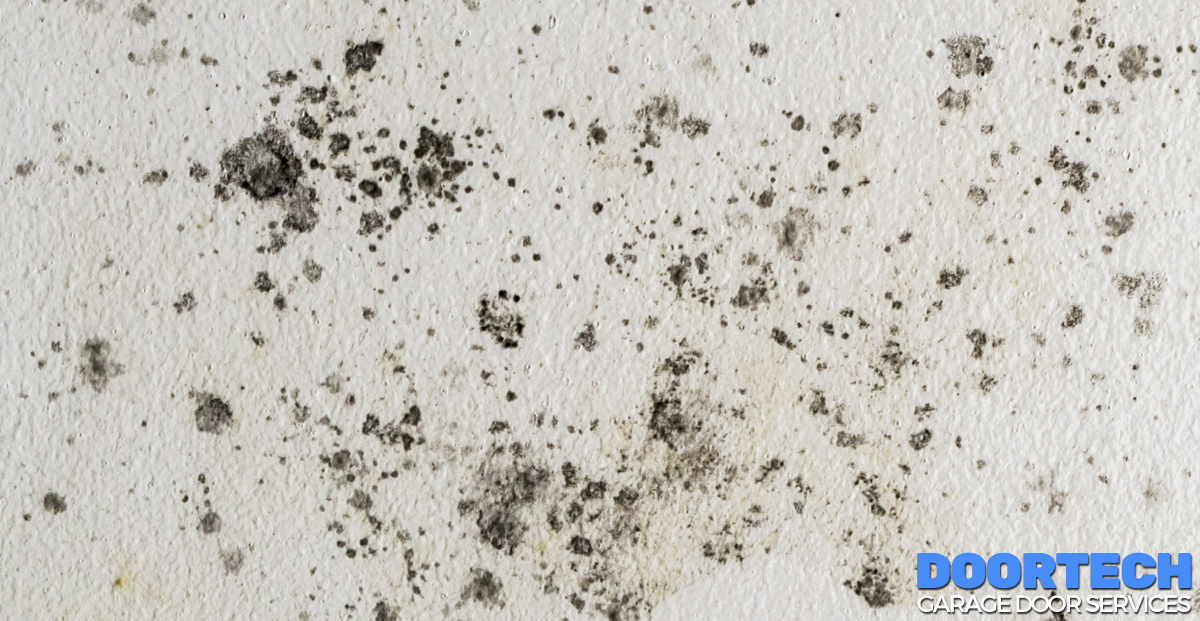
Mold and Mildew Tips
Mold and Mildew can put a real damper on the life of your garage doors. Whether you’re looking to get the most years out of your brand new garage door or keeping your existing door in great shape, it’s essential to protect your investment from the elements.
Mold and mildew grow best in closed and wet spaces, especially basements and garages. Left unchecked, your garage can become a source of unpleasant odors and allergies. Mold and mildew can also cause deterioration or discoloration if not removed.
To prevent mold and mildew before they start growing in your garage or around your garage door, follow these tips.
Inspect Your Garage and Door Regularly
By inspecting your garage and the door regularly, you can spot potential problems before they cause mildew or mold growth. If the garage door isn’t sealed correctly, water can get trapped, leading to mold or mildew.
Leaks or cracks in the garage’s structure can cause puddles and increase humidity in the building. Be sure to extend gutter downspouts away from the foundation by at least six feet so moisture doesn’t build up around the garage or door.
If you aren’t sure how to fix cracks, leaks, or broken seals, call the professionals at Door Tech in Gambrills, Maryland for a free estimate.
Improve Ventilation
A garage with poor ventilation can lead to excessive moisture, which can lead to mold or mildew. If you notice condensation on your walls or windows, then you have an air circulation problem.
This can be fixed by opening windows or allowing an exhaust fan to pull moisture out of the garage and away from the door. You can also use chemical moisture absorbers, like silica gel or activated alumina to remove moisture. The more fresh, dry air you can circulate through the garage, the better.
Humidity can also create moisture in your garage, which we know all too well living in Maryland. If you have humidity higher than 50% in your garage, you can use a dehumidifier to keep it between 30% and 50%.
Be Conscious of Building Materials
Using materials made of paper or wood in a garage can lead to mold growth by pulling in moisture from the air. For a mold- and mildew-free garage, use metal studs and pre-coated aluminum or vinyl siding instead of drywall.
It may cost more upfront, but you won’t have to battle with mold or mildew down the road.
Have a Good Drainage System
Living in Maryland, water or snow is bound to get into your garage eventually. While it’s not always preventable, having a sound drainage system and an adequately sloped floor can help water flow out of your garage fast. This will leave you with a dry garage less likely to harbor mold or mildew growth.
Clean Your Garage and Door
If you notice mold or mildew in your garage, you can clean it with a spray bottle filled with bleach or vinegar. Spray with window cleaner and leave the garage door open for ventilation. You might want to consider wearing a mask if the smell is too much. Allow the cleaner to soak for a few hours before scrubbing and rinsing the area.
If your garage door is dirty or has suspected mold, use a power washer to clean it inside and out. Scrub it down with soap and warm water and allow it to dry before closing the garage fully. You can also use vinegar on the door, but bleach can degrade the finish. Continue to inspect the garage door regularly to make sure there is no more mold or mildew buildup.
If you notice an unpleasant odor or musty smell in the garage, place an opened box of baking soda inside to absorb the smell. You can also mix a cup or two of vinegar with water in a spray bottle and spray the garage.
Your garage door needs to be maintained, as other areas of the home do. If your door is beyond cleaning, and you need to look into having it replaced, call us at Door Tech, and we’ll come out and give you an estimate for repair or replacement.
